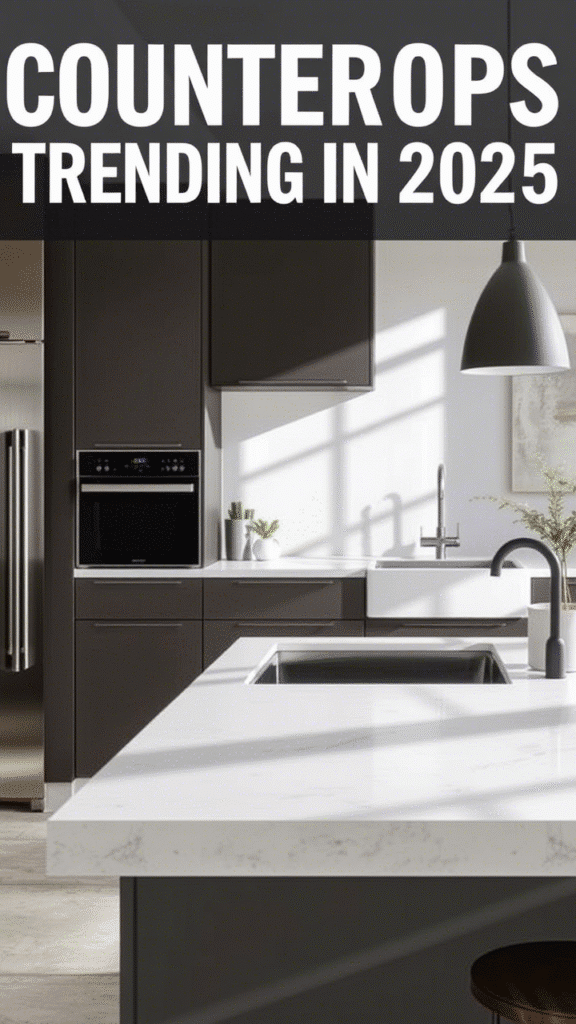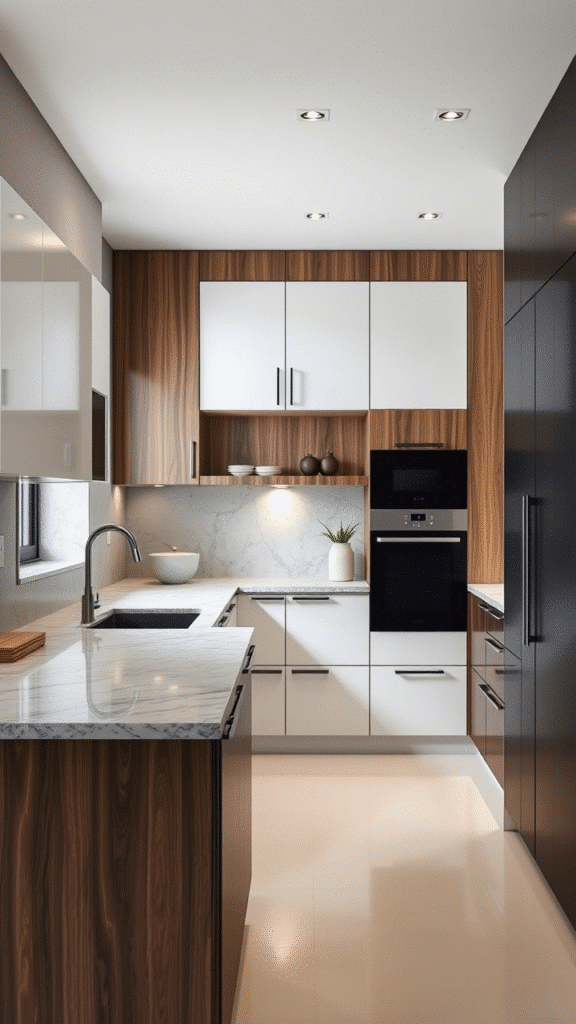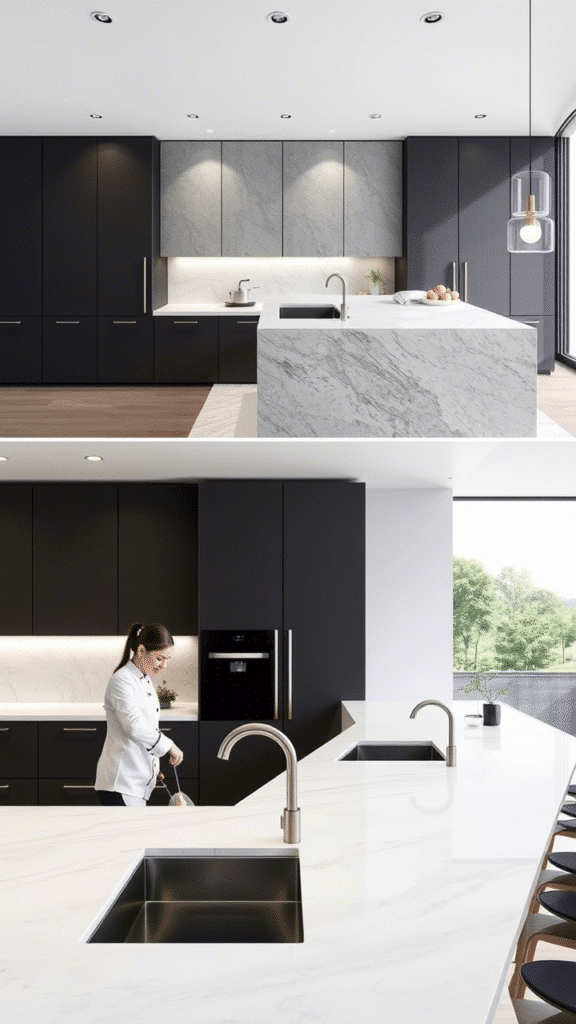Your kitchen countertop is more than just a functional surface—it’s the centerpiece of your kitchen design. Whether you’re renovating, remodeling, or simply updating your kitchen, choosing the right countertop material can transform the space, adding both style and functionality. In this comprehensive guide, we’ll explore the best countertop materials, the latest design trends, and essential tips to help you make the perfect choice
Choosing the Right Countertop Material for Your Kitchen
The first step in creating the kitchen of your dreams is choosing the right countertop material. The material you choose affects both the aesthetic appeal and the functionality of the kitchen. Let’s break down the most popular countertop options and what makes them unique.
Granite Countertops
Granite has been a top choice for kitchen countertops for decades. Known for its durability and timeless beauty, granite offers a natural, luxurious look that complements almost any kitchen style. It’s heat-resistant, scratch-resistant, and incredibly durable, making it ideal for high-traffic kitchens.
- Pros:
- Long-lasting
- Heat-resistant
- Scratch-resistant
- Unique patterns and colors
- Cons:
- Requires periodic sealing to prevent staining
- Can be expensive
- Heavy, requiring professional installation
Quartz Countertops
Quartz countertops have gained popularity in recent years, especially for modern kitchens. Made from natural stone and resin, quartz is non-porous, which makes it stain-resistant and bacteria-resistant. It also requires little maintenance compared to granite.
- Pros:
- Non-porous, making it easier to clean
- Available in a wide variety of colors and patterns
- Does not require sealing
- Low-maintenance
- Cons:
- Can be expensive
- Not as heat-resistant as granite
- Can be scratched by sharp objects
Butcher Block Countertops
For a warm, rustic look, butcher block countertops are a great option. These countertops are made from wood and offer a natural, cozy feel, often preferred in farmhouse or cottage-style kitchens.
- Pros:
- Adds warmth to the kitchen
- Can be sanded and refinished to remove scratches
- Ideal for food prep areas
- Often less expensive than granite or quartz
- Cons:
- Susceptible to scratches and dents
- Requires regular maintenance like oiling
- Prone to staining if not sealed properly
Marble Countertops
Marble countertops are synonymous with luxury. With their timeless beauty and unique veining, marble is a classic choice for those seeking a high-end kitchen design. While marble is aesthetically stunning, it’s more porous than granite and quartz, which makes it prone to staining.
- Pros:
- Elegant and luxurious appearance
- Heat-resistant
- Ideal for baking areas due to its cool surface
- Cons:
- Stains easily
- Requires frequent sealing
- Prone to scratching and chipping
Concrete Countertops
Concrete countertops are gaining traction in modern kitchens. Their industrial appeal, coupled with the ability to customize color and texture, makes concrete a great option for those looking to add a unique touch to their kitchen.
- Pros:
- Customizable (color, texture, shape)
- Heat and scratch-resistant
- Ideal for modern, industrial kitchens
- Cons:
- Requires sealing
- Prone to cracking over time
- Heavy and requires professional installation
Countertop Styles and Aesthetic Trends for 2025

As we move further into 2025, kitchen design trends are becoming more diverse. Here’s a look at the countertop styles that are expected to dominate the year.
Modern Elegance
The modern kitchen is all about sleek, clean lines. Minimalism is key, with an emphasis on high-tech materials like quartz and solid surface countertops that offer a seamless look. Dark, matte finishes are making a comeback, providing a sleek contrast to light-colored cabinetry.
- Key Features:
- Matte black or white finishes
- Seamless, edge-to-edge designs
- Clean, sharp lines
Industrial Charm
For a raw, urban vibe, concrete countertops are at the forefront. Paired with open shelving, exposed pipes, and stainless steel appliances, concrete creates a bold, industrial aesthetic. You can customize your concrete countertop with various textures and finishes, giving it a distinctive look.
- Key Features:
- Exposed concrete
- Stainless steel and reclaimed wood elements
- Exposed, unpolished finishes
Bold Color Statements
As kitchens become more personalized, colorful countertops are making their way into the design scene. Whether it’s a striking blue recycled glass or a vibrant green quartz, colorful countertops allow you to create a kitchen that reflects your style and personality.
- Key Features:
- Bright, bold colors like blue, green, and red
- Recycled glass for eco-conscious design
- Unusual combinations, like mixing patterned tiles with solid countertops
Countertop Edge Profiles – More Than Just a Border
While the countertop material is crucial, the edge profile can make all the difference. Let’s explore the popular countertop edges and how to choose the right one for your kitchen.
Beveled Edges
Beveled edges feature a slight angle and are often chosen for modern or contemporary kitchens. This edge profile can add a refined look without being too ornate, making it perfect for minimalist designs.
Bullnose Edges
The bullnose edge is rounded, providing a softer, more traditional look. This profile is family-friendly because it reduces the risk of sharp corners.
Waterfall Edges
Waterfall edges are all about dramatic flair. These edges extend vertically, allowing the material to flow down the sides of the countertop. This style works well in modern kitchens and adds a touch of sophistication.
How to Match Countertops with Kitchen Cabinets

When selecting countertops, it’s essential to consider how they’ll complement your cabinetry. Below are some tips to help you choose the best pairings for your kitchen design.
- Light Cabinets, Dark Countertops: Dark granite or quartz countertops paired with light-colored cabinets create a striking contrast that adds sophistication.
- Matching Wood Countertops with Wooden Cabinets: If you want a seamless, organic look, wood countertops can blend beautifully with wooden cabinetry, especially in rustic or farmhouse kitchens.
- Modern Pairings: For a clean, contemporary design, consider pairing solid surface or quartz countertops with sleek, handleless cabinetry.
Functionality Meets Design – Key Considerations for the Ideal Countertop Layout
Countertops are not just about looks; they play a vital role in the kitchen’s functionality. Here are some key factors to consider when designing the layout of your countertops.
Countertop Height
The height of your countertops can significantly impact comfort and efficiency. Standard countertop height is typically 36 inches, but for specific tasks like baking, you may want a lower height for easier access.
Multi-Functional Design
Maximize your kitchen’s functionality by integrating features like built-in cutting boards, under-counter storage, or pull-out drawers. These options make your countertops not only a space for food prep but also for organizational needs.
Maintaining and Caring for Your Kitchen Countertops
Proper care is essential to maintain the beauty and longevity of your countertops. Here are some maintenance tips:
- Granite: Seal granite countertops every 1-2 years to prevent stains and damage.
- Wood: Regularly oil your butcher block countertops to maintain their luster and prevent cracks.
- Quartz: Clean quartz countertops with mild soap and water, avoiding harsh chemicals.
Avoiding Common Damage
- Heat Protection: Always use trivets or heat pads to protect your countertop from hot pans, especially for wood and laminate surfaces.
- Scratch Prevention: Use cutting boards to protect surfaces from scratches, particularly on softer materials like marble and butcher block.
Eco-Friendly Countertop Materials – Sustainable Choices for the Conscious Consumer
Sustainability is a growing concern, and many homeowners are opting for eco-friendly materials in their kitchens. Here are a few options:
Recycled Glass
Recycled glass countertops are an excellent sustainable choice. These countertops are made from repurposed glass bottles and can be customized in a range of vibrant colors.
Sustainable Wood
For wood lovers, consider using certified sustainable wood sources. Bamboo is another eco-friendly option due to its fast-growing nature.
Trends and Innovations in Countertop Design

The countertop industry is constantly evolving, with new trends and technologies emerging regularly. Some of the latest innovations include:
- Smart Countertops: Technology is increasingly being integrated into countertops. Imagine having a built-in charging station or touch-sensitive surfaces that help you control your kitchen’s temperature or lighting.
- Eco-friendly Materials: Materials like recycled concrete and repurposed stone are becoming more accessible, making sustainable choices easier than ever.
Budgeting and Cost Breakdown – What to Expect
Here’s a general breakdown of countertop costs, including materials, installation, and long-term maintenance.
| Material | Average Cost per Sq. Ft. | Pros | Cons |
|---|---|---|---|
| Granite | $40 – $100 | Durable, heat-resistant | Requires sealing |
| Quartz | $50 – $150 | Low-maintenance, stylish | Expensive |
| Butcher Block | $20 – $70 | Warm, classic look | Prone to scratches |
| Marble | $50 – $150 | Luxurious, unique veining | Prone to staining |
| Concrete | $60 – $120 | Customizable, industrial | Requires sealing |
Conclusion
Choosing the right kitchen countertop is a big decision, but with the right information, you can select a material and style that fits your kitchen needs perfectly. Whether you’re after durability, eco-friendliness, or sleek modern design, there’s a countertop material that’s perfect for your home. Consider your lifestyle, budget, and aesthetic preferences when making the final choice.
Start visualizing your dream kitchen today and create a space that’s not only functional but beautiful and unique. Your countertops are waiting to tell your kitchen’s story!
